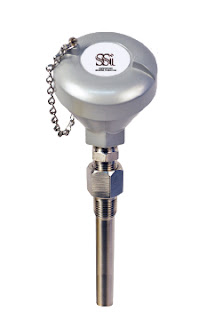 |
| Industrial Thermocouples |
 There are a number of metal combinations used to produce industrial thermocouples. Each combination has a respective set of performance attributes, operating temperatures, tolerances, and cost that may deliver best performance for a particular use.
There are a number of metal combinations used to produce industrial thermocouples. Each combination has a respective set of performance attributes, operating temperatures, tolerances, and cost that may deliver best performance for a particular use.Common Thermocouple Types and Composition
- Type J (Iron / Constantan)
- Type K (Chromel / Alumel)
- Type T (Copper / Constantan)
- Type E (Chromel / Constantan)
- Type N (Nicrosil / Nisil)
- Type B (Platinum / Rhodium)
- Type R (Platinum / Rhodium)
Generally, thermocouple sensor assemblies, often a tube enclosing the thermocouple junction, can be grounded, ungrounded, or exposed. The wires constituting the tip of a grounded probe are attached to the inside of the probe wall, allowing for maximal heat transfer through the probe wall to the junction while maintaining a physical separation between the junction and the measured media or object. The difference between grounded thermocouple probes and ungrounded thermocouple probes is that in ungrounded probes, the junction is not attached to the probe wall. For this reason, ungrounded probes can exhibit slower response time, but do provide electrical isolation of the junction from the housing. An exposed thermocouple will have the junction protruding from the probe tube or perforations in the tube to allow actual contact between the measured material and the junction. While this provides very rapid response, the junction is exposed to damage and wear.
 |
| Various Thermocouple Styles |
Download your temperature sensor selection catalog here.
Contact Alliance Technical Sales with your temperature sensing requirement. Their application engineers will help you select the best sensor for the job.